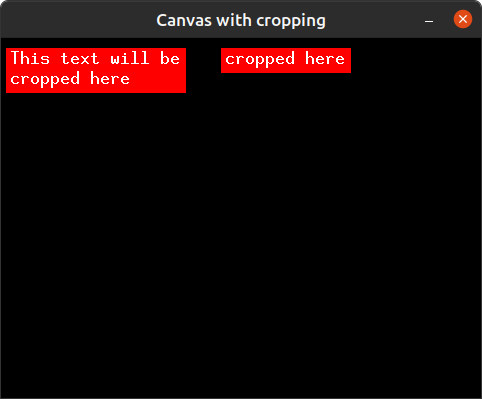6 releases
| 0.3.1 | May 11, 2024 |
|---|---|
| 0.3.0 | Nov 6, 2023 |
| 0.2.0 | Aug 8, 2022 |
| 0.1.2 | Jun 24, 2022 |
| 0.1.0 | May 17, 2022 |
#226 in Embedded development
64 downloads per month
Used in embedded-ui
40KB
500 lines
embedded-canvas
canvas - a piece of cloth backed or framed as a surface for a painting
NOTE: This crate is still in development and may have breaking changes from one version to another.
embedded-canvas is a convenient crate for embedded-graphics
and provides a Canvas and CanvasAt on which you
can draw anything with ease before drawing the pixels on the embedded display.
Based on embedded-graphics-core and embedded-graphics
(see transform feature in Crate features).
This crate is no_std and it has 2 sets of canvases:
CanvasandCanvasAt- requireallocfeatureCCanvasandCCanvasAt- do not requireallocfeature because they use const generics instead.
The main advantages of the canvases in this crate are:
- Transparency - pixels that haven't been drawn, won't override pixels on the display.

Example: Transparency - The canvas content (a circle) is drawn on the display where there's already a drawn square.
- Cropping - The ability to crop leaves only the part of the canvas you want to draw on the display. This is especially useful when you want to partially show text, figures and images.

Example: Cropping text - The full canvas content is drawn on the left and only portion of it is cropped and drawn on the right.
How to work with canvases
There are two main canvases you can work with:
Canvas / CCanavas
A canvas which you can draw on with origin Point::zero().
The canvas location is not set for the provided display.
After drawing decide where to place it on the display using the methods:
Canvas::place_at(top_left: Point) -> CanvasAt(withallocfeature) orCCanvas::place_at(top_left: Point) -> CCanvasAtCanvas::place_center(center: Point) -> CanvasAt(withallocfeature) orCCanvas::place_center(center: Point) -> CCanvasAt
CanvasAt / CCanvasAt
CanvasAt/CCanvasAt are a type of canvas ready to be drawn on the display at specified
location (hence the name CanvasAt/CCanvasAt).
There are two ways of using CanvasAt/CCanvasAt:
- Directly placing the
CanvasAt/CCanavasAton specified location on the display and drawing inside. - Create a
Canvas/CCanvasand when ready to draw it on the display place theCanvas/CCanvasat specified location using the methods:Canvas::place_at(top_left: Point) -> CanvasAt(withallocfeature) andCCanvas::place_at(top_left: Point) -> CCanvasAtCanvas::place_center(center: Point) -> CanvasAt(withallocfeature) andCCanvas::place_center(center: Point) -> CCanvasAt
Crate features
defaultfeatures -transformalloc- enablesCanvasandCanvasAt.transform- enables the trait implementation ofembedded_graphics::transform::TransformforCanvasAt.
License
Licensed under either of Apache License, Version 2.0 or MIT license at your option.
Contribution
Unless you explicitly state otherwise, any contribution intentionally submitted for inclusion in this project by you, as defined in the Apache-2.0 license, shall be dual licensed as above, without any additional terms or conditions.
Dependencies
~0.5–1.1MB
~15K SLoC